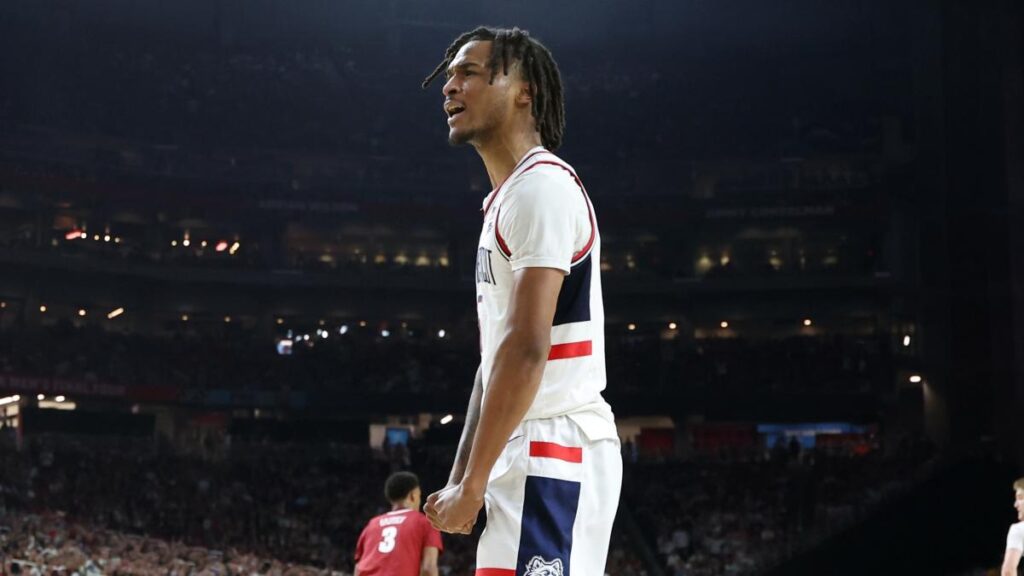GLENDALE, Ariz. — Stephon Castle's eyes widened Saturday night when he realized how Alabama was going to protect him on the first possession.
The UW freshman defender remained rooted in the paint, dangling his body 8 to 10 feet away and daring to shoot.
Alabama's bold strategy backfired when it coaxed newfound aggressiveness out of a physically gifted player who was tentatively selected as a future lottery pick. The long and athletic Castle turned in the best performance of his career, exploding for 21 points against the fierce Crimson Tide in the second of two Final Four games on Saturday, leading UW to 86 points. -72 and won with great difficulty.
Castle's offense started in the first three minutes, shooting 27 percent from behind the arc with two 3-pointers, and Alabama's Grant Nelson had no objections. Castle also backed up diminutive guard Mark Sears and overwhelmed him with a layup. Before long, he had the confidence to drive to the rim and backcut for tough floaters and alley-oop dunks.
“It was kind of disrespectful to them to protect that much of the rear,” Castle said. “I took advantage of it early. I saw the ball come in early. I thought it started a great night for me.”
Castle's breakthrough performance ensured that this year will be a rare year in which the best teams in college basketball will meet in the national title game. Monday night will feature UConn vs. Purdue and Kling Cong vs. Big Maple.
More than half of Associated Press polls this season have either UW or Purdue in the lead. The two remain on a collision course as other contenders are eliminated, with the Huskies winning by an average of 25 points in their five NCAA Tournament games and the Boilermakers winning by just 19.6 points.
The dream title match has finally been decided. Will UW become college basketball's first back-to-back national champions since the University of Florida in 2006 and 2007, a year after Purdue's humiliating 16-1 upset loss to Fairleigh Dickinson in the first round? Either complete the ultimate revenge arc.
Purdue is expected to protect Castle differently than Alabama. He is a five-star freshman, and had he chosen to play for virtually any other program other than UConn, he would have regularly produced 21-point nights.
Castle said he came to the university knowing he would sometimes have to postpone the return of standouts Donovan Clingan, Alex Karavan and Tristen Newton. He accepted the role of complementary scorer and perimeter stopper without complaint. Because that's what UConn needed from him to win.
“I never won anything in high school,” Castle said. “I've never won a national championship or a state championship. I wanted to come here and play for a coach who has experience winning before and who can teach me how to win.” It was easy.”
At a time when college basketball is skewed in age and transfers are on the rise, Castle's breakout performance in the Final Four served as a reminder that elite freshmen still have value. Castle, 19, was the only teenager in the starting five for the Final Four teams and was arguably the best player in both games Saturday at Glendale.
With Alabama raining down three points in the first half, Castle kept UConn within striking distance and helped the Huskies pull away midway through the second half. If he hadn't picked up his fourth foul with University leading by eight points with 6:35 left in the final, he might have surpassed his career-high 21.
“Steph is a great player, very talented,” UW guard Hassan Diarra said. “If you're not going to guard him, he's going to go for 20 points. He's got so many tools in his game. If you're going to leave him like this, He will leave.”
Entering Saturday's game, Castle was already considered an NBA lottery pick and a high prospect on the verge of potential stardom. The game against Alabama proved that Castle is a prospect at that level and perhaps opened eyes to just how good he can be.
Nine days ago, Alabama head coach Nate Oats employed a similar strategy against North Carolina in the Sweet 16, freeing up the Tar Heels' non-shooters and forcing them to take uncomfortable shots. .
This approach worked once. It didn't work twice.
“My shooting numbers weren’t the best, so I understand that,” Castle said. “But I work really hard. It felt really good to see those shots go in early.”


